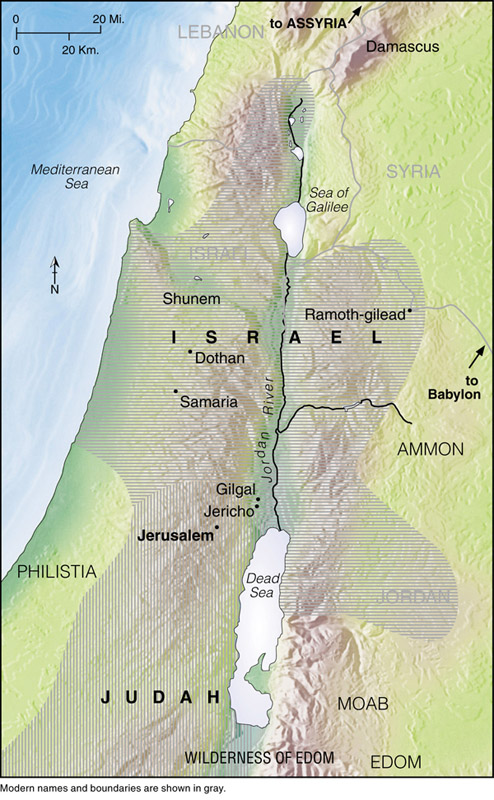KEY PLACES IN 2 KINGS

The history of both Israel and Judah was much affected by the prophet Elisha’s ministry. He served Israel for 50 years, fighting the idolatry of its kings and calling its people back to God.
1 Jericho Elijah’s ministry had come to an end. He touched his cloak to the Jordan River, and he and Elisha crossed on dry ground. Elijah was taken by God in a whirlwind, and Elisha returned alone with the cloak. The prophets in Jericho realized that Elisha was Elijah’s replacement (1:1—2:25).
2 Wilderness of Edom The king of Moab rebelled against Israel, so the nations of Israel, Judah, and Edom decided to attack from the wilderness of Edom but ran out of water. The kings consulted Elisha, who said God would send both water and victory (3:1–27).
3 Shunem Elisha cared for individuals and their needs. He helped a woman clear a debt by giving her a supply of oil to sell. For another family in Shunem, he raised a son from the dead (4:1–37).
4 Gilgal Elisha cared for the young prophets in Gilgal—he removed poison from a stew, made a small amount of food feed everyone, and even caused an ax head to float so it could be retrieved. It was to Elisha that Naaman, a commander in the Syrian army, came to be healed of leprosy (4:38—6:7).
5 Dothan Although he cured a Syrian commander’s leprosy, Elisha was loyal to Israel. He knew the Syrian army’s battle plans and kept Israel’s king informed. The Syrian king tracked Elisha down in Dothan and surrounded the city, hoping to kill him. But Elisha prayed that the Syrians would be blinded; then he led the blinded army into Samaria, Israel’s capital city (6:8–23).
6 Samaria But the Syrians didn’t learn their lesson. They later besieged Samaria. Ironically, Israel’s king thought it was Elisha’s fault, but Elisha said food would be available in abundance the next day. True to Elisha’s word, the Lord caused panic in the Syrian camp, and the enemy ran, leaving their supplies to Samaria’s starving people (6:24—7:20).
7 Damascus Despite Elisha’s loyalty to Israel, he obeyed God and traveled to Damascus, the capital of Syria. King Ben-hadad was sick, and he sent Hazael to ask Elisha if he would recover. Elisha knew the king would die and told this to Hazael. But Hazael then murdered Ben-hadad, making himself king. Later, Israel and Judah joined forces to fight this new Syrian threat (8:1–29).
8 Ramoth-gilead As Israel and Judah warred with Syria, Elisha sent a young prophet to Ramoth-gilead to anoint Jehu as Israel’s next king. Jehu set out to destroy the wicked dynasties of Israel and Judah, killing kings Joram and Ahaziah, and wicked Queen Jezebel. He then destroyed King Ahab’s family and all the Baal worshipers in Israel (9:1—11:1).
9 Jerusalem Power-hungry Athaliah became queen of Judah when her son Ahaziah was killed. She had all her grandsons killed except Joash, who was hidden by his aunt. Joash was crowned king at the age of seven and overthrew Athaliah. Meanwhile in Samaria, the Syrians continued to harass Israel. Israel’s new king met with Elisha and was told that he would be victorious over Syria three times (11:2—13:19).
Following Elisha’s death came a series of evil kings in Israel. Their idolatry and rejection of God caused their downfall. The Assyrian Empire captured Samaria and took most of the Israelites into captivity (13:20—17:41). Judah had a short reprieve because of a few good kings who destroyed idols and worshiped God. But many strayed from God. So Jerusalem fell to the next world power, Babylon (18:1—25:30).